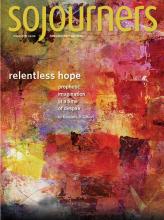SIX YEARS AGO I began gradually losing cognitive function: getting lost in familiar areas, losing mental arithmetic skills, getting confused, and losing memory. A year later a neurologist diagnosed me with “probable” Alzheimer’s disease.
As a physician, I knew what “probable” meant: He thought I had it but wouldn’t make a formal diagnosis until it got worse. I believed I had Alzheimer’s disease. One year later, however, my cognitive dysfunction, while still real even today, had improved slightly and, more important, had not been progressive. A new medical test demonstrated conclusively that, whatever it was, I didn’t have Alzheimer’s. So... for one year I had “Alzheimer’s”; then I didn’t.
I hesitate to write this for fear of downplaying the very real suffering of Alzheimer’s disease. For caregivers, it can be especially devastating. But my year of believing I had Alzheimer’s was among the best of my life. I became less aloof; my friends said I was more pleasant; I was emotionally and spiritually more open; I experienced God’s grace.
I chose not to keep my diagnosis to myself. I went slowly but informed an ever-widening circle. After I announced it to our small congregation, they overwhelmed me with their love and support. It had always been there, I’m sure, but now I experienced it.
To chronicle my losses, I began a blog, “Watching the Lights Go Out.” A small community developed around the blog, mostly caregivers but others with cognitive loss, too, some much more advanced than mine. I discovered a stunning hopefulness. A minority of people with Alzheimer’s certainly become paranoid, hostile, and generally unpleasant. But the majority, it seems, are like Janice Hicks’ mom: more receptive, perhaps, and living “squarely in the present.”
Read the Full Article

